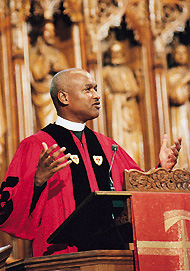![]()
Departments
![]()

|
Week of 11 June 1999 |
Vol. II, No. 35 |
Feature Article
Baccalaureate sermon
Elevating careers to callings
By Michael B. Shavelson
The Rev. Dr. Ray Hammond is a man who always takes his calls. He believes the rest of us should as well.
Hammond, who is both a physician and the pastor of the Bethel AME Church in Boston, preached the Baccalaureate sermon at Marsh Chapel on Commencement morning. Addressing his congregation of graduates and their families, he predicted that they will have to change careers several times over the course of their lives. That may be frightening to some, he said, but "it may once and for all free us from the notion of career and open up the door to calling.
"A strange and funny word," he said, "almost quaint and premodern." Being called "is something that happens to prophets, and apostles, and preachers."
|
|
|
Rev. Dr. Ray Hammond |
But then came the realization that "doing God's thing has some real benefits," and he experienced a reawakening of faith. When he told a friend that he felt that God might be directing him toward medicine, she told him, "Don't forget that you have not chosen a career in medicine, you have been called to a ministry of healing."
Her words clarified his sense of self, and he turned the message back to the graduating students. A calling "is what brings together our faith and our work. . . . If only we could move beyond the false dichotomy, between the faith I have and the work I do. If only we could move beyond the notion of job, the concept of career, and lay hold of calling." It is in a calling, he said, that "the man or woman of faith hears the summons . . . to fulfillment of God's purpose in all they do."
Every job can be transformed into a calling, he insisted. "By the way I . . . keep a ledger, till the soil, prepare a meal, advise a client, love my child, serve a customer, I witness to my faith and win on God's behalf a good reputation before the world."
Looking over the worshippers, many of whom were fanning themselves against the rising morning heat, he reminded them that "there was nothing wrong with Jesus being a carpenter, for he never lost sight of the fact that he was really called to build a kingdom of God."
It is up to the individual to have the faith to transform career into calling, he said. "I think there's a calling for you. The only question is whether you will answer that call."
Hammond was presented with a doctor of humane letters, honoris causa, at the All-University Commencement exercises later that day.
